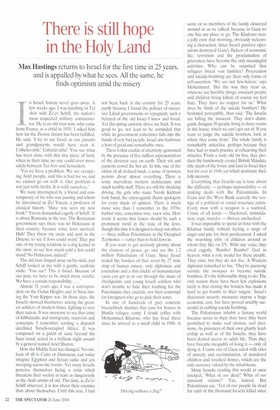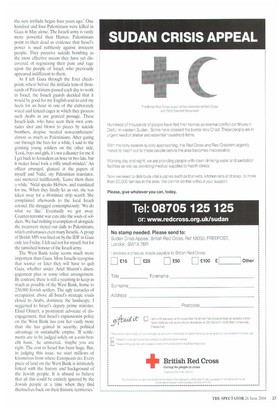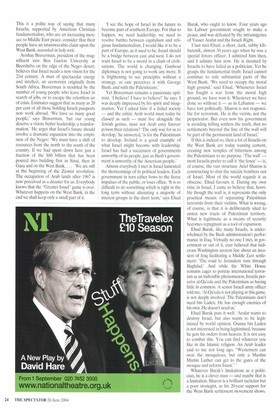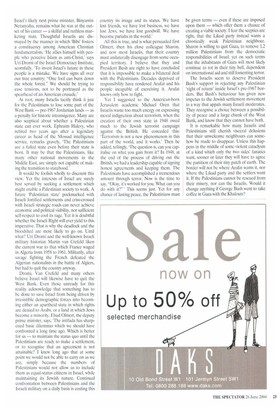There is still hope in the Holy Land
Max Hastings returns to Israel for the first time in 25 years, and is appalled by what he sees. All the same, he finds optimism amid the misery
I, n Israel, history never goes away. A few weeks ago, I was lunching in Tel Aviv with Z,e'ev Schiff, the nation's most respected military commenta
tor. He is an old man now, who came from France as a child in 1935. I asked him how far the Zionist dream has been fulfilled. He said, 'I try to see Israel as our parents and grandparents would have seen it. Unbelievable! Unbelievable! You see what has been done with this tiny piece of land, when in their time no one could even move safely between Tel Aviv and Jerusalem.
'Yet we have a problem. We are occupying Arab people, and this is had for us, and we cannot go on with it Our problem is not just with Arabs. It is with ourselves.'
We were interrupted by a friend and contemporary of his who was passing and whom he introduced as Zvi Yavetz, a professor of classical history. 'Have you seen my new book?' Yavetz demanded eagerly of Schiff. 'It is about Romania in the war. The Romanian government says there was no Holocaust in their country, because some Jews survived. Hah! They threw my uncle and aunt in the Dniestr, to see if Jews could swim! They put one of my young relations in a dog kennel in the snow, to see how much cold a Jew could stand! No Holocaust, indeed!'
The old man limped away on his stick, and Schiff looked at me with a gentle, sardonic smile. You see? This is Israel. Because of our past, we have to be much more careful. We have a certain responsibility. .
Almost 31 years ago, I was a correspondent on the Golan Heights and in Sinai during the Yom Kippur war. In those days, the Israelis showed themselves among the greatest soldiers of modern times, fighting to save their nation. It was awesome to see that army of kibbutzniks and immigrants, reservists and conscripts. I remember sending a dispatch datelined 'Israeli-occupied Africa'. It was composed on a patch of sand beyond the Suez canal, seized in a brilliant night assault by a general named Arid l Sharon.
How the Middle East has changed. No one, least of all in Cairo or Damascus, can today imagine Egyptian and Syrian tanks and jets sweeping across the border. Yet many Israelis perceive themselves facing a crisis which threatens their society at least as dangerously as the Arab armies of old. This time, as Ze'ev Schiff observed, it is less about their enemies than about themselves. Until this year, I had not been back in the county for 25 years, partly because I found the policies of successive Likud governments so repugnant, such a betrayal of the old Israel I knew and loved. Yet this spring curiosity drove me back. It was good to go, not least to be reminded that while its government sometimes falls into the hands of very bad people. Israel also harbours a host of good and remarkable ones.
There is that crackle of electricity, generated by the presence of five million representatives of the cleverest race on earth. Their wit and passions crowd the hot air. In this, one of the oldest of all civilised lands, a sense of newness persists about almost everything. There is some marvellous modem architecture and much terrible stuff. There are still the shocking driving, the girls who make Nicole Kidman look banal, the extravagantly fluent apologists for every shade of opinion. There is much more wire than I remember in the 1970s: barbed wire, concertina wire, razor wire. How ironic it seems that fences should be such a prominent motif in the state of the Jews, though this time it is designed to keep out others — three million Palestinians in the Occupied Territories rather than to hold Jews in.
If you want to get seriously gloomy about the chances of peace, go and see the 1.2 million Palestinians of Gaza. Since Israel sealed the borders of that seven by 27 mile strip of human misery, only diplomats and journalists and a thin trickle of humanitarian cases can get in or out through the maze of checkpoints and young Israeli soldiers who don't trouble to hide their loathing for the Palestinians they encircle, nor their contempt for foreigners who go to pick their sores.
In one of hundreds of grey concrete breezeblock shanties that pass for houses in Shatila refugee camp, I drank coffee with Mohammed Khalout, who has lived there since he arrived as a small child in 1948. A score or so members of his family clustered around us as we talked, because in Gaza no one has any place to go. The Khalouts were a jolly crew that morning, obviously welcoming a distraction. Since Israeli punitive operations destroyed Gaza's flickers of economic life, terrorism and the proclamation of grievances have become the only meaningful activities. Who can be surprised that refugees breed vast families? Procreation and suicide-bombing are their only forms of self-assertion. 'We are not Jew-haters,' says Mohammed. 'But the way they treat us, when we see horrible things, innocent people and children being killed, of course we feel hate. They have no respect for us.' What does he think of the suicide bombers? He hesitated perceptibly, then said, The Israelis are killing the innocent. They don't distinguish. Imagine 50 people living in three rooms in this house, which we can't get out of. If you want to judge the suicide bombers, look at where they come from.' The whole family is remarkably articulate, perhaps because they have had so much practice at rehearsing their miseries. From a rusty old tin box, they produce the handsomely crested British Mandate title deeds of the house and land in Israel they lost for ever in 1948, yet which dominate their folk memory.
Everything that Israelis say is true about the difficulty — perhaps impossibility — of making deals with the Palestinians. In Gaza and the West Bank scarcely the vestige of a political or social structure exists. Every man with a weapon is a warlord. Crime of all kinds — blackmail, intimidation, rape, murder — thrives unchecked.
It was impossible to spend an hour with the Khalout family without feeling a surge of anger and pity for their predicament. I asked the swarming tribe of children around us whom they like on TV. With one voice, they cried eagerly, 'Rambo! Rambo!' God in heaven, what a role model for these people. They exist, but they do not live. A Western diplomat remarked to me, 'They're queueing outside the mosques to become suicide bombers. It's the fashionable thing to do. The only reason there have been few explosions lately is that closing the borders has made it hard to get bombs to their targets.' Israel's draconian security measures impose a huge economic cost, but have proved notably successful in curbing suicide bombing.
The Palestinians inhabit a fantasy world because never in their lives have they been permitted to make real choices, real decisions. As prisoners of their own ghastly leadership as well as of the Israelis, they have been denied access to adult life. Thus they have become incapable of living it — only of dying it. I came out of Gaza sated with tales of atrocity and recrimination, of murdered children and wrecked homes, which are the only currency valued by the inhabitants.
Many Israelis reading this would at once interject, 'What of our dead? What of our innocent victims?' Yes, indeed. But Palestinians say, 'Ten of our people lie dead for each of the thousand Israelis killed since
the new intifada began four years ago.' One hundred and four Palestinians were killed in Gaza in May alone. The Israeli army is vastly more powerful than Hamas. Palestinians point to their dead as evidence that Israel's power is used ruthlessly against innocent people. They perceive suicide bombing as the most effective means they have yet discovered of registering their pain and rage upon the people of Israel, who previously appeared indifferent to them.
As I left Gaza through the Erez checkpoint, where before the intifada tens of thousands of Palestinians passed each day to work in Israel, the Israeli guards decided that it would be good for my English soul to cool my heels for an hour in one of the elaborately wired and fenced cages in which they process such Arabs as are granted passage. These Israeli kids, who have seen their own comrades shot and blown to pieces by suicide bombers, despise 'neutral non-combatants' almost as much as Palestinians. After gazing Out through the bars for a while, I said to the grinning young soldiers on the other side, 'Look, boys and girls, it's not a disaster for me if I get back to Jerusalem an hour or two late, but it makes Israel look a trifle small-minded.' An officer emerged, glanced at the papers of myself and Nidal, my Palestinian translator, and muttered indifferently, 'Leave them there a while.' Nidal speaks Hebrew, and translated for me. When they finally let us out, she was taken away for a 40-minute strip search. She complained afterwards to the local Israeli colonel. He shrugged contemptuously: We do what we like.' Eventually we got away. Counter-terrorist war eats into the souls of soldiers. We had nothing to complain of alongside the treatment meted out daily to Palestinians, which embarrasses even many Israelis. A group of British MPs was fired on by the IDF in Gaza only last Friday. I felt sad not for myself, but for the tarnished honour of the Israeli army.
The West Bank today seems much more important than Gaza. Most Israelis recognise that sooner or later they will have to quit Gaza, whether under Arid l Sharon's disengagement plan or some other arrangement. By contrast, there is still a yearning to keep as much as possible of the West Bank, home to 230,000 Jewish settlers. The ugly tentacles of occupation, above all Israel's strategic roads closed to Arabs, dominate the landscape. I suggested to Israel's deputy prime minister, Ehud Olmert, a prominent advocate of disengagement, that Israel's expansionist policy on the West Bank has cost her vastly more than she has gained in security, political advantage or sustainable empire. 'If settlements are to be judged solely on a cost-benefit basis,' he answered, 'maybe you are right. The cost to Israel has been huge. But, in judging this issue, we start millions of kilometres from where Europeans do. Every piece of land on the West Bank is intimately linked with the history and background of the Jewish people. It is absurd to believe that all this could be entirely ignored by the Jewish people at a time when they find themselves back on their historic territories.' This is a polite way of saying that many Israelis, supported by American Christian fundamentalists, who are an increasing menace to Middle East peace, consider that their people have an unanswerable claim upon the West Bank, recorded in holy writ Avishay Braverman, president of the magnificent new Ben Gurion University at Beersheba on the edge of the Negev desert, believes that Israel needs a new vision for the 21st century. A man of spectacular energy and intellect, an economist originally from South Africa, Braverman is troubled by the number of young people who leave Israel in search of jobs, or to escape the relentless air of crisis. Estimates suggest that as many as 20 per cent of all those holding Israeli passports now work abroad. 'We have so many good people,' says Braverman, 'but our young deserve a vision, better leadership, a transformation.' He urges that Israel's future should involve a dramatic expansion into the emptiness of the Negev: 'We must have a shift of resources from the north to the south of the country. If we had spent down here just a fraction of the $60 billion that has been poured into building first in Sinai, then in Gaza and on the West Bank.. We are still at the beginning of the Zionist revolution. The occupation of Arab lands after 1967 is now perceived as a disaster for us. Everybody knows that the "Greater Israel" game is over. Whatever happens on the West Bank, in the end we shall keep only a small part of it. 'I see the hope of Israel in the future to become part of southern Europe. For that to happen, we need leadership, we need to resolve battles between capitalism and religious fundamentalism. I would like it to be a part of Europe, as it used to be. Israel should be a bridge between east and west. I do not want Israel to be a sword in a clash of civilisations, The world is changing. Gunboat diplomacy is not going to work any more. It is frightening to see principles without a strategy, as one perceives it with George Bush, and with the Palestinians.'
Yet Braverman remains a passionate optimist. 'I believe! I have to believe!' he says. I was deeply impressed by his spirit and imagination. Yet I asked him: if a failed society — and the entire Arab world must today be classed as such — must live alongside the Jewish genius, must not Arab envy forever poison their relations? 'The only way for us to develop,' he answered, 'is for the Palestinians to develop. Ireland is a good example of what Israel might become with leadership. Israel has had a succession of governments unworthy of its people, just as Bush's government is unworthy of the American people.'
Almost everybody I met in Israel lamented the shortcomings of its political leaders. Each government in turn either bows to the fierce impulses of the public, or loses office. It is so difficult to do something which is right in the long term without alienating a majority of interest groups in the short term,' says Ehud Barak, who ought to know. Four years ago his Labour government sought to make a peace, and was defeated by the intransigence of Yasser Arafat and the Israeli Right.
I last met Ehud, a short, dark, tubby kibbutznik, almost 30 years ago when he was a special forces officer. I admired him then, and I admire him now. He is deemed by Israelis to have failed as a politician. Yet he grasps the fundamental truth: Israel cannot continue to rule substantial parts of the West Bank. 'We need to occupy the moral high ground,' said Ehud. 'Whenever Israel has fought a war from the moral high ground, we have won it. Whenever we have done so without it — as in Lebanon — we have lost politically. Sharon is not responsible for terrorism. He is the victim, not the perpetrator. But even now his government is avoiding telling settlers the truth, that no settlements beyond the line of the wall will be part of the permanent land of Israel.'
If this is indeed so, then a lot of Israelis on the West Bank are today wasting cement, creating new temples of bitterness among the Palestinians to no purpose. The wall' — most Israelis prefer to call it 'the fence' — is, of course, the vast structure Arid l Sharon is constructing to shut the suicide bombers out of Israel. Most of the world regards it as obscene. Ehud favours it. During my own time in Israel, I came to believe that, horrible though the wall is, it represents the only practical means of separating Palestinian terrorists from their victims. What is wrong, of course, is that it is deliberately sited to annex new tracts of Palestinian territory. What is legitimate as a means of security becomes repugnant as a tool of expansion.
Ehud Barak, like many Israelis, is underwhelmed by the Bush administration's performance in Iraq. Virtually no one I met, in government or out of it, ever believed that ludicrous Washington neocon line about an invasion of Iraq facilitating a Middle East settlement: 'The road to Jerusalem runs through Baghdad.' And while the White House remains eager to portray international terrorism as an indivisible phenomenon, Israelis perceive al-Qa'eda and the Palestinians as having little in common. A senior Israeli army officer told me, `Al-Qa'eda is not playing in this game, is not deeply involved. The Palestinians don't need bin Laden. He has enough enemies of his own. He doesn't need us.'
Ehud Barak puts it well: 'Arafat wants to destroy Israel, but also wants to be legitimised by world opinion. Osama bin Laden is not interested in being legitimised, because he gets his orders from heaven. It is not easy to combat this. You can find whatever you like in the Islamic religion. An Arab leader said to me not long ago, "Westerners can swat the mosquitoes, but only a Muslim Martin Luther can get to the gates of the mosque and reform Islam."' Whatever Barak's limitations as a politician, he is a clever man — and maybe that is a limitation. Sharon is a brilliant tactician but a poor strategist, as his 20-year support for the West Bank settlement movement shows. Israel's likely next prime minister, Binyamin Netanyahu, remains what he was at the outset of his career — a skilful and ruthless marketing man, Thoughtful Israelis are dismayed by the manner in which `Bibi' fosters a constituency among American Christian fundamentalists. 'He allies himself with people who perceive Islam as anti-Christ,' says Uri Dromi of the Israel Democracy Institute, scornfully, 'To invest Israel's future in these people is a mistake. We have signs all over our tree country: "One fool can burn down the whole forest." We should be trying to ease tensions. not to be portrayed as the spearhead of an American crusade.'
At root, many Israelis tacitly think it just for the Palestinians to lose some part of the West Bank — pre-1967 Jordanian lands — as a penalty for historic intransigence. Many are also sceptical about whether a Palestinian state can ever work. Ephraim Halon,,, who retired two years ago after a legendary career as head of the Mossad intelligence service, remarks gravely, 'The Palestinians are a failed state even before their state is born. It may be that the Palestinians, like many other national movements in the Middle East, are simply not capable of making the transition to statehood.'
It would be foolish wholly to discount this view. Yet the interests of Israel are surely best served by seeking a settlement which might enable a Palestinian society to work. A future 'Palestinian state pockmarked with Israeli fortified settlements and criss-crossed with Israeli strategic roads can never achieve economic and political viability, nor sufficient self-respect to cool its rage. Yet it is doubtful whether the Israeli Right will ever yield to this imperative. That is why the deadlock and the bloodshed are most likely to go on. Until what? Uri Dromi and the well-known Israeli military historian Martin van Crefeld liken the current war to that which France waged in Algeria from 1958 to 1961. Militarily, after savage fighting the French defeated the Algerian nationalists in the battle of Algiers, but had to quit the country anyway.
Dromi, Van Crefeld and many others believe Israel will likewise have to quit the West Bank. Even those unready for this reality acknowledge that something has to be done to save Israel from being driven by irresistible demographic forces into becoming either an apartheid state in which rights are denied to Arabs, or a land in which Jews become a minority, Ehud Olmert, the deputy prime minister, says, 'The intifada has sharpened basic dilemmas which we should have confronted a long time ago. Which is better for us — to maintain the status quo until the Palestinians are ready to make a settlement, or to recognise that an agreement is not attainable? I knew long ago that at some point we would not be able to carry on as we are, simply because the numbers of Palestinians would not allow us to include them as equal-status citizens in Israel, while maintaining its Jewish nature. Continual confrontation between Palestinians and the Israeli military on a daily basis is costing this country its image and its status. We have lost friends, we have lost business, we have lost Jews, we have lost goodwill. We have become pariahs in the world.'
All this is true, and is what persuaded first Olmert, then his close colleague Sharon, and now most Israelis. that their country must unilaterally disengage from some occupied territory. I believe that they and President Bush are right to have concluded that it is impossible to make a bilateral deal with the Palestinians. Decades deprived of responsibility have rendered Arafat and his people incapable of exercising it. Arafat knows only how to fight.
Yet I suggested to the American-born Jerusalem academic Michael Oren that Israelis waste too much energy on expressing moral indignation about terrorism, when the creation of their own state in 1948 owed much to the Jewish terrorist campaign against the British. He conceded this: 'Terrorism is not a new phenomenon in this part of the world, and it works.' Then he added, tellingly, The question is, can you capitalise on what you gain from it? In 1948, at the end of the process of driving out the British, we had a leadership capable of signing honest agreements and keeping them. The Palestinians have accomplished a tremendous amount through terror. Now is the time to say, "Okay, it's worked for you. What can you do with it?"' This seems just. Yet for any chance of lasting peace, the Palestinians must be given terms — even if these are imposed upon them — which offer them a chance of creating a viable society. I fear the sceptics are right, that the Likud party instead wants a chronically weak Palestinian neighbour. Sharon is willing to quit Gaza, to remove 1.2 million Palestinians from the democratic responsibilities of Israel, yet on such terms that the inhabitants of Gaza will most likely continue to rot in their tiny hell, dependent on international aid and still fomenting terror.
The Israelis seem to deserve President Bush's support in rejecting any Palestinian 'right of return' inside Israel's pre-1967 borders. But Bush's behaviour has given new impetus to the Jewish settlement movement in a way that appals many Israeli moderates. They recognise a choice between a possibility of peace and a large chunk of the West Bank, and know that they cannot have both.
It is remarkable how many Israelis and Palestinians still cherish visceral delusions that their unwelcome neighbours can somehow be made to disappear. Unless this happens in the middle of some violent cataclysm of a kind which only the two sides' fanatics want, sooner or later they will have to agree the partition of their tiny patch of earth. The border will not be where Arafat wants it, nor where the Likud party and the settlers want it. If the Palestinians cannot be rescued from their misery, nor can the Israelis. Would it change anything if George Bush went to take coffee in Gaza with the Khalouts?





































































 Previous page
Previous page